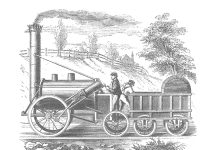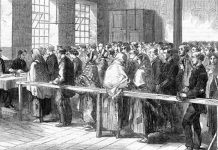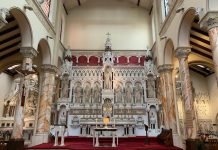Today in our series the great and good of the region,of we go back nearly two hundred years to 1825 when on this day Isabella Varley was born on Oldham Street.
You might not recognise the name but you will know the book that she wrote which in the nineteenth century would give the people of the City a glimpse into their pre Victorian past, the Irk and the Irwell flowing around in the days before river embankments and roadways, Railway arches and esplanades had swept away seventeenth and eighteenth century Manchester.
The images that her book evoked, the brick wall around the ancient Collegiate graveyard, irregular fronted rows of quaint old houses, some only reached by scrambling down rocks and stones,the narrow roadway of Hunts Bank overhanging and threatening to fall into the Irwell.
Isabella was eldest child of James and Ameila, her grandfather also James, a Yorkshire man, a strong Quaker who spoke fourteen languages and had toured Europe on foot, being present at the storming of the Bastille.
He had discovered the secret of using chloride of lime for bleaching but had lost thousands of pounds unsuccessfully defending the patent.
Her father followed in his footsteps, an experimental chemist but was also an amateur artist, and politician.His well stocked library was available to his daughter as were the thoughts and ideas of the many visitors to the household who would direct her mind towards literature and the theatre.
Some of her earliest memories were of the theatre, visits to the Theatre Royal where she was given dancing lessons from Miss Sibery on the stage.
At the age of sixteen, her first poem was published in the Manchester Guardian, The Dying Girl to her mother, other poems would appear in the Oddfellow’s Magazine, one called the Neglected Wife would earnn her five guineas in prize money.In 1843 her work was published in a volume called Ivy Leaves.
She became political, joining the Anti Corn Law league on the ladies committee where she organized stalls and took part in its great fund raising bazaar, a ten day event in the Theatre Royal.
She met her husband, a Birmingham Poet, George Linneas Banks through her work in the Oddfellow’s magazine.
They married in 1845, his career in journalism taking them all around the country when he became editor of the Harrogate Advertiser, the Birmingham Mercury, The Dublin Daily Express, the Durham Chronicle, the Sussex Mercury and the Windsor Royal Standard.
His career would also blossom as a distinguished public speaker, Isabella would occasionally join him on the podium but mainly during their first eighteen years of marriage, her work was mainly reviews and pieces for the newspapers to which George was involved.
Encouraged by her friends her first novel God’s Providence House was published in 1865, Daisies In the Grass followed, a collection of poems by her and her husband and then a second novel Stung to the Quick, set in Durham and inspired by a building they had lived in during their time in the city.
Illness intervened but Isabella Celeb Booth’s Clerk for a weekly magazine and what would become the Manchester Man for Cassels Magazine, later published as a cheap uniform edition by Abel Heywood and Sons in Manchester.
Other novels followed, Glory, set in Wiltshire, Wooers and Winners, More than Coronets, Forbidden to Wed and In his own Hand.
The Manchester Man survives, it’s antiquarianism, it’s general sketch of Manchester life at the beginning of the nineteenth century along with several full length portraits of well known people of the time.
It tells the story of Jabez Clegg, the ‘Manchester Man’ of the title, mirroring the economic growth of the city of Manchester during the early years of the nineteenth century and vividly portraying the Corn Law riots and the Peterloo Massacre of 1819.
It ran to five editions in Mrs Banks’s lifetime and six since her death, and continues to be widely read and enjoyed. A quotation from the book appears on the gravestone of Tony Wilson Manchester’s Southern Cemetery.
Her husband died in 1881 just five years after the publication of the book.She continued to write from her Harrogate home, including Wooers and Winners, a Yorkshire tale on the similar lines of the Manchester Man, featuring characters from the Craven District but later moved to North London where she lived with her one unmarried daughter.
Her study was filled with memorabilia of Manchester.She died in 1897







